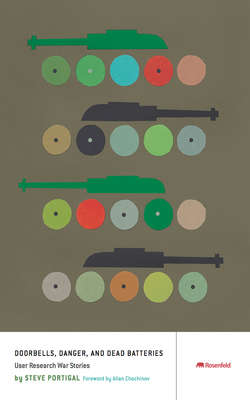Читать книгу Doorbells, Danger, and Dead Batteries - Steve Portigal - Страница 8
На сайте Литреса книга снята с продажи.
FOREWORD
ОглавлениеWe all love war stories. We love their two axiomatic narrative arcs: the protagonist having it all, losing it all, and then getting some of it back, along with a pile of redemption. We love the protagonist who has nothing, quests for something, finds it, and then invariably realizes that she or he was better off at the beginning. In fiction, these plots are predictable, but in real life, much less so. In real life, the “tale” is a precipitate that forms over time . . . precisely through its retelling.
In this book, Doorbells, Danger, and Dead Batteries: User Research War Stories, Steve Portigal assembles an impressive platoon of these tales. But Steve is also an expert observer—indeed he does this for a living—so his gift in organizing and pulling out common threads throughout the book helps the reader make sense of these stories. Each section is bookended with an incredibly wise setup and useful takeaway, but he also provides permission for some dangling threads—acknowledging the temptation to slap a pretty bow on every anecdote. Rather, he provides permission to be okay with some lack of resolution.
War stories, as stories, contain all the usual tropes we see in good stories, but these stories are authentically unpredictable. And it’s only in hindsight that they earn their stripes—to keep the metaphor—to be recounted, reexamined, and retold.
There are other military metaphors to explore as well. I personally have a hard time reconciling the notion of “rules of engagement” in the actual war arena, but certainly in the world of design that forms the scaffolding for the stories in this book, there are very clear rules of “design” engagement. Design research, user research, ethnography—these are all pretty mature disciplines at this point, with prescribed methods, best practices, and a more-or-less-agreed-upon moral code for working with human subjects. When things go wrong in this arena, well, they can go very wrong indeed.
There’s also the “badge of honor” that people with war stories earn. They’d argue that you have to go through something to earn the medal (versus going around or over it), and they’d be right. Triumphing over adversity, or handling yourself gracefully when things go wrong, or just improvising in the moment can be hugely satisfying. In fact, it’s in the retelling of the war story where the ultimate satisfaction (and sometimes the revenge!) actually lies. Like any retelling of a story, it usually gets better with age: the pacing improves, the extraneous details get excised as the critical ones sharpen up, and the whole thing just gets polished until the war story itself becomes a kind of crafted object. And abstracted from the event that birthed it, the story itself becomes more powerful. And worthy of collecting.
So we are grateful to Steve Portigal for assembling such a rich breadth of tales in his book. Throughout, he talks about the power of these stories—to instruct, to serve as catharsis, to entertain, to inspire. This book certainly delivers on all of these. It’s hysterical, it’s heartbreaking, and in the end it’s, well, a triumph. And that’s how wars are supposed to end, right?
—Allan Chochinov
Founding Chair, SVA MFA Products of Design
Partner, Core77
